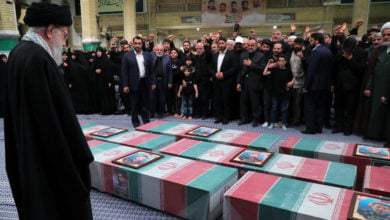On Sept. 2, 2008, Ibrahim Jassam, a journalist working for the Reuters international news service, was dragged from his home in Mahmudiya, Iraq, in the middle of the night by U.S. and Iraqi soldiers. His family members, including his elderly father, were brutalized by the troops who used attack dogs in the raid.
|
Jassam is one of many journalists detained and held without charge by U.S. occupying troops in Iraq and Afghanistan. More than 200 journalists have been killed in Iraq since the 2003 invasion.
Two months after his arrest, the Iraqi Central Criminal Court ruled that there were no grounds for holding Jassam and that he should be released. The U.S. commanders refused.
Lt. Col. Patricia Johnson, in an official statement, wrote: “Though we appreciate the decision of the Central Criminal Court of Iraq in the Ibrahim Jassam case, their decision does not negate the intelligence information that currently lists him as a threat to Iraqi security and stability.” (Reuters, Sept. 2)
Dripping with colonial arrogance, the statement makes a joke of any claim that Iraq is a sovereign country. It says, in effect: “Your courts can say whatever they want, we will decide what is best for you.”
It must be remembered that no U.S. soldier or contractor has been tried by Iraqi courts, regardless of whatever crimes they may have committed against Iraqi people. This is in keeping with the old colonial doctrine of “extra-territoriality,” which considered the colonizers “superior,” not subject to justice at the hands of the colonized people. It was and is a license to kill, rape and loot with impunity.
The Jassam case shows that the U.S. colonial occupation of Iraq has gone a step further than the traditional extra-territoriality. Iraqi courts are denied the right to pass judgment not only on the colonizers, but also on Iraqis. That this is the case is made clear by the extraordinarily condescending words “Though we appreciate the decision of the Central Criminal Court of Iraq …”
The sentence would read more accurately by substituting “ignore” for “appreciate.”
There are journalists and then there are journalists
The editor-in-chief of Reuters, David Schlesinger, had called for Jassam to either be charged or be released, labeling his imprisonment without charges “unacceptable.” Joel Simon of the New York-based Committee to Protect Journalists has called Jassam’s detention “unjust,” while lamenting that “it also undermines the ability of the U.S. government to effectively advocate for press freedom around the world.” (Reuters, Sept. 2)
Which brings up an interesting point.
While the U.S. government holds Jassam without charge, the corporate mass media here has ignored his case or given it short shrift—in sharp contrast with their massive campaign on behalf of two recently released U.S. journalists, Euna Lee and Laura Ling. Lee and Ling were held for four months in North Korea (DPRK) earlier this year. The highest U.S. officials, including Secretary of State Hillary Clinton and President Barack Obama joined in. Non-stop and highly emotional coverage was standard fare on every network. Countless “human rights” organizations in the United States made the case their highest priority.
Coincidentally, on the day marking the anniversary of Jassam’s jailing, Lee and Ling released an account of their arrest and imprisonment in the DPRK. They admit in the report that they had, in fact, illegally crossed from China into North Korea, a country with which the United States is still at war. (Associated Press, Sept. 2) A 1953 truce ended major combat in the U.S. war against Korea—which took more than four million Korean lives—but no peace treaty has ever been signed. Tens of thousands of U.S. troops remain in South Korea today.
Lee and Ling were pardoned and released from their 12-year prison sentences for illegally entering North Korea and espionage after former President Bill Clinton traveled to the DPRK’s capital, Pyongyang, to meet with President Kim Jong-Il. While in custody, Lee and Ling were allowed continual phone contact with their families in the United States. Their return to the United States and reunification with family and friends was shown for days on CNN, Fox, CBS, ABC, and the list goes on.
The Obama administration and the mass media conducted a similar campaign for Roxana Saberi, a writer who was arrested, convicted and then released by Iran.
Meanwhile, a year after his arrest, the family and friends of journalist Ibrahim Jassam—one of thousands of uncharged detainees of the U.S. occupation—know nothing of his status or condition.
The cases of Lee, Ling and Saberi on the one hand, and Jassam on the other, show that the U.S. government advocates “press freedom around the world” when and where it serves its interests.
The idea of the United States as a true “beacon of democracy” is as false as the notion that Iraq is today an independent country.







